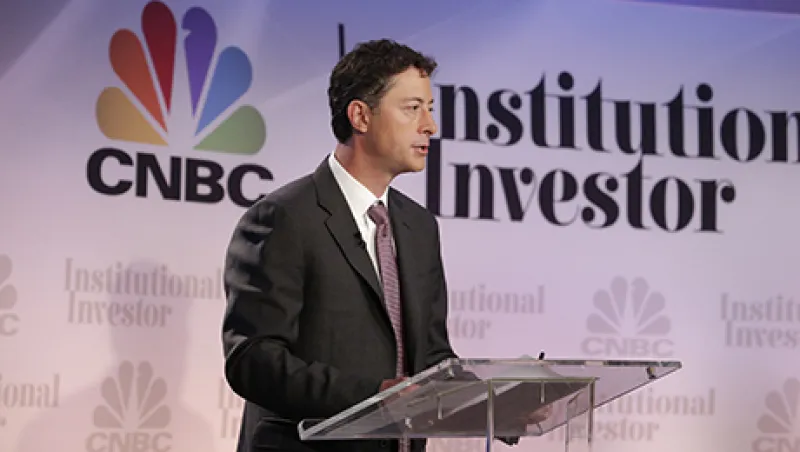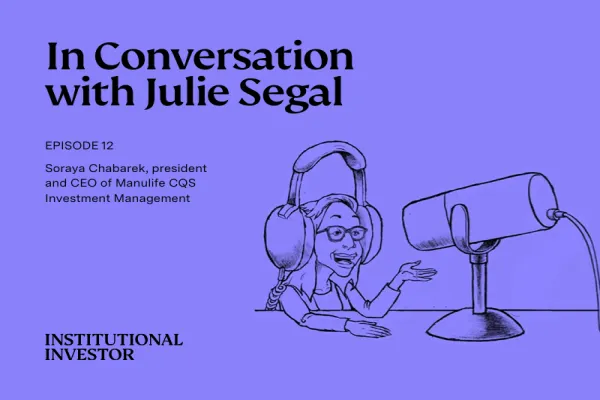Andrew Ross Sorkin broke news on the Squawk Box set at Institutional Investor and CNBC’s Delivering Alpha conference last week when he reported that Time Warner had rejected 21st Century Fox’s $80 billion takeover offer. The spurning of Rupert Murdoch quickly became the talk of Delivering Alpha, with some of the hedge fund industry’s biggest names giving their takes on the deal. Citadel founder Kenneth Griffin, whose firm’s portfolio includes shares of both Time Warner and 21st Century Fox, said the merger “makes a lot of sense,” while a doubtful John Paulson, known best for making billions on the subprime market meltdown, concluded, “It could work out, but it’s not that exciting.”
A much lesser-known hedge fund manager, Jeffrey Smith, also had plenty to say about a possible merger, but he was focused on the packaging industry. Smith, the 42-year-old managing member, CEO and CIO of New York–based Starboard Value, was the first of three “Next Generation” panelists tasked with presenting their best trading ideas for 2014.
The Starboard co-founder captivated the audience with his methodically laid-out proposal to turn around $5 billion-in-revenue packaging company MeadWestvaco Corp. even as his presentation sailed well past the allotted five minutes. Starboard holds a 5.6 percent stake in MWV; on June 2, Smith sent a letter to the company’s chairman and CEO, John Luke Jr., outlining in painstaking detail how he could improve his business. Smith believes that the Richmond, Virginia–based conglomerate — made up of five business segments managed by the Luke family for more than a century — is at least 33 percent undervalued because of its poor capital allocation, bloated cost structure and lack of operational focus. “The value of the underlying business is being obscured by excessive corporate overhead expenses,” Smith explained. His activist-oriented hedge fund firm is pushing for cost cuts, improved margins, a spin-off of noncore assets and a stock buyback that will help boost MWV’s stock price to $59 from $43 per share — “and that’s conservative,” Smith asserted.
Smith and his team at Starboard may not meet much resistance from MeadWestvaco’s Luke. The packaging conglomerate took a stab at streamlining its business operations months before Smith’s letter, announcing in January a plan targeting as much as $125 million in annual cost savings within the next two years. New York–based Starboard Value, which manages roughly $3 billion in assets and unfunded commitments, is encouraged by the scheme but thinks more-aggressive restructuring is needed to reduce MeadWestvaco’s expenses to competitive levels. Smith and fellow Starboard managing members Peter Feld and Mark Mitchell contend that by consolidating MWV’s regional headquarters, trimming duplicative staff and reducing operating expenses across the five business lines — especially, the food and beverage, home, health and beauty, and industrial segments — the company could save as much as $300 million a year.
Smith, Feld and Mitchell spun off Starboard Value from New York–based investment bank Cowen Group in 2011. Starboard has posted a 15.5 percent annualized return since 2002, when Smith and Mitchell launched it at New York–based asset management firm Ramius, which was later merged with Cowen. Feld joined them in 2005 after spending several years as an analyst in the technology investment banking group at Banc of America Securities.
The Starboard team is also urging a spin-off of MWV’s highly profitable noncore specialty chemicals unit, which manufactures and distributes pine chemicals and activated carbon. Though the business is a cash cow that has helped MWV fund its dividend payments to shareholders, “the time is right [for a spin-off] because there is a robust M&A market for this business,” Smith argued at Delivering Alpha.
MeadWestvaco’s specialty chemicals segment has grown at a 15.4 percent annualized rate, and its earnings before interest, taxes, depreciation and amortization margin is 26.7 percent. The spin-off is “extremely attractive,” said Smith, who has a BS in economics from the University of Pennsylvania’s Wharton School. “We [at Starboard] believe it could be worth $3.5 billion.” MeadWestvaco has already publicly disclosed its openness to selling the business.
Where Smith has split from MWV’s current restructuring plan is his proposed pension fund play — a move seldom seen since the 1980s. MWV has an enviable $1.5 billion overfunded pension asset and more than $120 million per year in pension income. “It’s hard to extract cash from a pension plan,” explained Smith, “but you can extract value” by merging with a packaging company that has an underfunded pension plan. He cited Rock-Tenn Co. and International Paper Co. as two potential partners, each with unfunded pension liabilities exceeding $1 billion.
Ultimately, any deal comes down to the interest of the shareholders. Starboard holds one of the largest stakes in MeadWestvaco; its 5.6 percent holding is nearly six times the size of the Luke family’s.
This is not Smith’s first crack at activist investing. In the past decade he’s taken on Internet giant AOL, office supply chain Office Depot and furniture retailer and leaser Aaron’s; he is currently battling with casual-dining-chain operator Darden Restaurants. Starboard has made money in 84 percent of its activist campaigns so far.
Luke has yet to issue an official response to Smith’s June letter, but the Starboard manager asserts that his firm and MeadWestvaco have engaged in “good, constructivist conversations.” Still, when asked by one of his Delivering Alpha panelists if Starboard would pursue a proxy fight, Smith concluded: “If we need to, we’ll get more actively involved. We want to see substantial improvement for shareholders. If that’s not going to happen, we’ll stand behind the investment.”
Get more on hedge funds.






